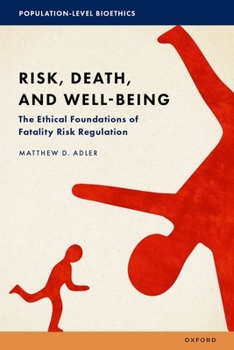Risk, Death, and Well-Being: The Ethical Foundations of Fatality Risk Regulation
This is an open access title available under the terms of a CC BY-NC-ND 4.0 International license. It is free to read on the Oxford Academic platform and offered as a free PDF download from OUP and selected open access locations. A wide range of governmental policies characteristic of the modern state seek to reduce individuals' fatality risks--risks that arise from air and water pollution, pathogens, food ingredients and contaminants, motor vehicles, infrastructure, radiation, workplace accidents, alcohol and recreational drugs, firearms, consumer products, tobacco, natural disasters, and other sources. Risk, Death, and Well-Being provides a rigorous treatment of the ethics of fatality risk regulation. It does so through the lens of welfare-consequentialism--specifically, lifetime welfarism, with a particular focus on utilitarianism and prioritarianism. The ethical ranking of possible worlds depends on the patterns of lifetime well-being in the worlds. Premature death is ethically significant insofar as it changes the lifetime well-being of the person who dies and perhaps others. At the level of policy choice, the book deploys the social-welfare-function (SWF) framework--which is the most systematic decision--procedure for implementing lifetime welfarism. It shows, in detail, how the SWF methodology can be brought to bear in assessing risk-regulation policies. Every individual faces a policy-specific lottery over lifetime well-being, as determined by their risk profile (probability of surviving the current year and future years) and attribute profile (the attributes the individual will have in the current year and each future year if alive rather than dead). In short, a policy corresponds to an array of individual risk and attribute profiles, which can then be assigned a utilitarian or prioritarian value. The SWF methodology as thus applied to risk regulation differs quite substantially from cost-benefit analysis (CBA), which is currently the dominant policy-assessment procedure in governmental practice.
Format:Hardcover
Language:English
ISBN:0197505953
ISBN13:9780197505953
Release Date:July 2025
Publisher:Oxford University Press
Length:354 Pages
Weight:1.44 lbs.
Dimensions:1.1" x 6.5" x 9.3"
Related Subjects
PhilosophyCustomer Reviews
0 rating





